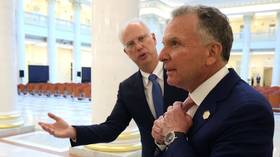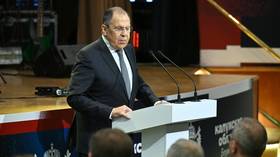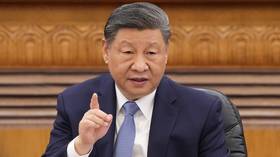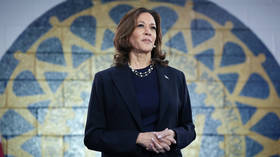British lapdog gets ready to be set loose
Britain is to choose its next Prime Minister on the 6th of May, so candidates from the three main parties thrashed out foreign policy issues Thursday during a live TV debate to show off their willingness to change it.
America’s lapdog – that’s how many see the UK’s relationship with its transatlantic cousin. Forged under Bush and Blair, the “special relationship” does not appear to have changed much under their successors.
But now, the UK’s is in the market for a new Prime Minister. Each of the debate participants is vying for the job in a series of debates and this week covered foreign policy.
It’s an abstract concept to many people, but not for the British Legion, a social club for service people and their families.
People there believe that Great Britain is supposed to be its own democratic country, with its own government and parliament, not an underdog.
While debating on a TV show, Conservative leader David Cameron and Liberal Democrat leader Nick Clegg have both alluded to Britain being stronger. And if that’s what the British public wants, it perhaps should not hold its breath.
It is by no means clear who will be the next resident of 10 Downing Street. But the result of Thursday’s debate will stick in people’s minds and those who resent the UK’s slavish relationship with the US will have looked for some pretty strong rhetoric, something they may not find with any of the three main parties.
However, according to Paul Ingram of the British American Security Information Council, recently there has been a major shift in relations between America and Britain.
“The big shift in this relationship has been the election of Obama, which has been basically a shift away from traditional alliances and towards reaching out to new relationships around the world,” he said.
“I think the British in particular, and the Europeans more generally, have discovered that the Americans’ eye is no longer exclusively on Europe and the Obama administration is very much looking towards a world at last free from the constraints of Cold War mentality, and they are looking at the Middle East and Asia and up-and-coming economic powers of India and China.”
There is also a great deal of discontent in the UK about its relationship to the EU. The Lisbon Treaty was particularly controversial, with many supporting a referendum on the law, which some criticize for weakening national electorates.Nigel Farage from UK’s Independent Party thinks that the “UK leaving the EU would benefit the UK.”
“I suspect that the break up of the EU would benefit all the other member states. I think that Europe as a continent would be much happier if the French were French, the Germans were Germans, and the British were British, they had their own democracies, they ran their own economies, they traded and co-operated together and tried to be good next door neighbours,” concluded Farage.
The British Independent Party is not one of the main parties, but the Demos think tank says the electorate does have a choice on Europe.
Demos’ researcher Max Wind-Cowie believes “The Liberal Democrats have a much more traditional comfort with the European Union, with greater integration, they still support joining the Euro despite what’s happened in the Eurozone over the last two years. Whereas the Conservatives come from a much more Euro-sceptic standpoint.”
“Labour having been in government has, on foreign policy issues at least, a very pragmatic and centrist viewpoint,” he noted.
For now, much of the British electorate sees its country as subservient to the US and in the grips of the EU. But whether they have a clear option to change that is another matter.













